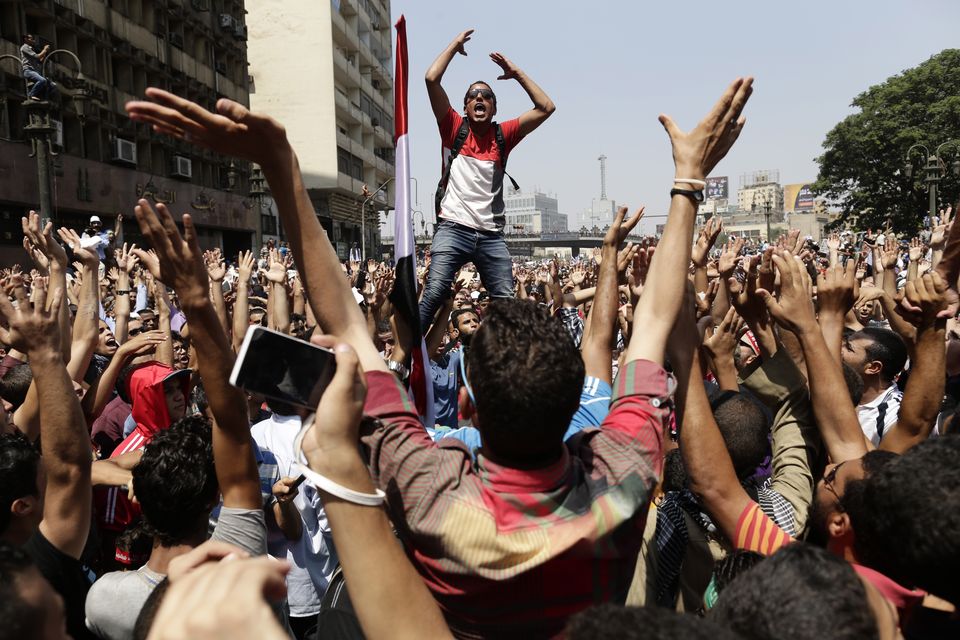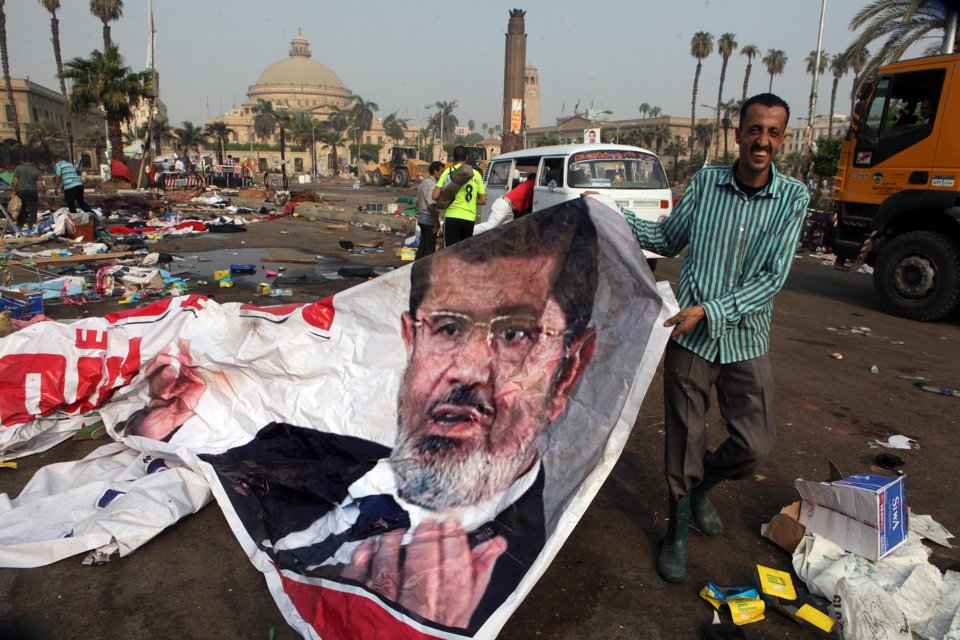
At least 36 Muslim Brotherhood members were killed in Egypt on Sunday evening as a prisoner convoy was attacked by militants, leading to fierce gun battles with security forces who reportedly used tear gas to quiet the prisoners, resulting in their suffocating to death.
The incident came as at least 25 security force members were gunned down in the Sinai Peninsula in a militant attack that left the country questioning if the new round of violence can be stemmed. Some 1,000 people have been killed since military and police raided a Brotherhood sit-in last Wednesday, and many are fearful the country could find itself facing civil war if the social strife and sectarian-related violence does not end.
In central Cairo on Friday, Brotherhood supporters of deposed President Mohamed Morsi exchanged gunfire in street battles with security forces. According to reports, dozens of people were killed and bodies lined the inside of a nearby mosque in the Ramsis area of the Egyptian capital.
Eyewitnesses reported that Brotherhood supporters, wielding pistols and automatic weapons, had taken positions on a downtown Cairo bridge and were shooting at civilians, with many warning people to stay inside. Egypt is facing a tumultuous situation where violence and death have become commonplace in the past three days.
All this comes after the military and police attempted to disperse a sit-in of Morsi supporters at the Raba’a al-Adawiya mosque in a northern Cairo district earlier this week. The Brotherhood supporters, who had entrenched themselves in the area, responded by shooting at the security forces. The ensuing reaction by security forces turned the area into a war zone that left over 600 people dead.
Earlier, across the country on Wednesday and into Thursday, Brotherhood supporters had attacked some 25 churches, leaving many to question whether the sectarian nature of the violence could engulf more of the country and lead to further escalations of violence directed at religious minorities, namely Christians who make up some 10 to 15 percent of Egypt's population.
Coptic Christian sources say violence targeting Egyptian churches, business and homes erupted and numerous churches and buildings have been set ablaze by Morsi’s backers, according to Coptic activists and leaders. Photos of burning churches on social media sites confirmed the attacks.
The interim president Adli Mansour has already declared a month-long national state of emergency and imposed a 7pm - 6am curfuw across much of the country, including Cairo. Minister of Interior Mohamed Ibrahim said there will no longer be any sit-ins permitted across the country.
Eyewitnesses and Coptic activists reported that security forces were not present to protect the churches at the time of the attacks, unlike during normal periods of calm when security are stationed at churches across the country. The reports say Muslim Brotherhood supporters were attacking the churches with stones, Molotov bottles and gunfire.
Several churches were set on fire and Coptic shops were robbed and vandalized, as fear of the attacks spread further. For weeks, Coptic activists warned about hateful slogans being written on churches, and images of Coptic homes and shops being tagged with a black X. The list of the Christian religious sites attacked on Wednesday included a monastery of nuns that was set on fire in Suez, among religious schools and a Coptic priest’s home was burnt to the ground.
Churches were attacked in Suiez, Fayoum, Minya, Sohag and Alexandria. A statement by the head of the Anglican Church Safwat al-Bayaty, issued to churches in Egypt, called on people to remain inside the churches and on look-out, and to notify police in case of an imminent attack.
Attacks on churches increased after the Egyptian army ousted Morsi on July 3. Several churches were besieged as attempts of break-ins took place, in Fayoum, al-Arish and in Upper Egypt. Islamist hardliners have accused the Egyptian Church of campaigning against the Brotherhood and Morsi, and siding with the military against them. Large segments of the Coptic population were part of the January 2011 revolution and the June 2013 uprising against Morsi that led to his ouster by military forces several days later.
Islamists accused Copts of supporting the popular action and launched attacks, mainly outside the capital, out of sight from security forces.
Coptic Pope Tawadros II sided with the military’s decision to remove Morsi, and was present in talks that led to that decision. Enraged Islamist protesters began attacking the churches soon after, leading to last week’s violence.
The General Assembly of Copts in Egypt said it is starting a fundraising campaign, for Muslims and Copts to contribute to, in an effort “to help rebuild the churches,” some of which date over a hundred years old.
The Egyptian Initiative for Personal Rights (EIPR) and a consortium of other rights groups in Egypt had warned of a coming sectarian battle ahead of the military’s action against the pro-Morsi sit-in last week. On August 7, a statement issued by the EIPR and others called on security forces to maintain control of the situation and protect churches from attacks.
“The undersigned organizations further denounce the continued negligence of the institutions of the state to provide the necessary protection to Christian citizens, to decisively confront sectarian attacks, and to enforce the law by holding those responsible for the acts of sectarian violence which have been seen in several governorates to account. This negligence reveals that the pattern of impunity which spread during the Mubarak era and remained in place throughout the rule of the Muslim Brotherhood continues to this day, even after both of these regimes were overthrown,” said the statement.
But as of Friday, as violence continued to spiral out of control, Egyptians remained fearful of what is coming next. They have called on each other to remain indoors, away from windows for fear of stray bullets. Egypt remains on the edge of chaos and the rising attacks on Christians across the country have shown that violence may continue unabated.
3 WAYS TO SHOW YOUR SUPPORT
- Log in to post comments















